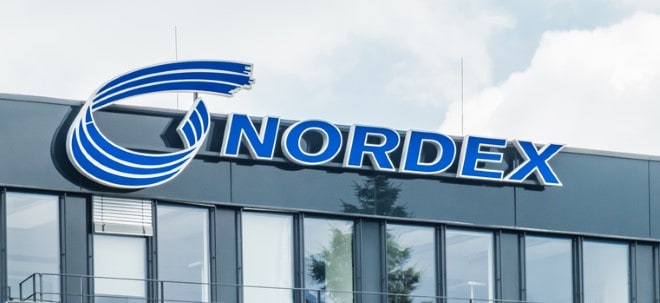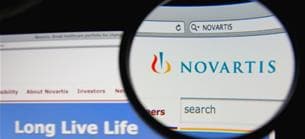Press Release: Novartis Fabhalta(R) shows statistically significant and clinically meaningful improvements in hemoglobin in new population of patients with PNH
Werte in diesem Artikel
-- In the Phase IIIB APPULSE-PNH study, adult patients with paroxysmal
nocturnal hemoglobinuria (PNH) who switched to Fabhalta experienced
clinically meaningful improvements in hemoglobin (Hb) levels of 2.01 g/dL
on average1,2
-- APPULSE-PNH evaluated Fabhalta in a population with higher baseline
hemoglobin (Hb) levels than those enrolled in the pivotal Phase III
program, expanding the clinical evidence base1,2
-- No patients treated with Fabhalta required transfusions, experienced
breakthrough hemolysis (BTH) or had any major adverse vascular events
during the treatment period1
-- Patients treated with Fabhalta reported an average improvement in fatigue
from baseline of 4.88 points at Day 84 and 4.29 points at Day 168 of the
study (as measured by FACIT-Fatigue score)1
Basel, June 12, 2025 -- Novartis announced positive results from APPULSE-PNH, a Phase IIIB study evaluating the efficacy and safety of twice-daily oral monotherapy Fabhalta(R) (iptacopan) in adult patients with paroxysmal nocturnal hemoglobinuria (PNH) with Hb levels >=10g/dL who switched from anti-C5 therapies (eculizumab or ravulizumab)(1). After 24 weeks of treatment with Fabhalta, the Hb level improved on average by 2.01 g/dL (95% CI, 1.74, 2.29) with most patients achieving normal or near-normal levels (1). Data will be presented at the European Hematology Association (EHA) Congress 2025.
"Today, some patients living with PNH have unmet needs not addressed by eculizumab or ravulizumab," said Austin Kulasekararaj, Consultant Hematologist, Kings College Hospital and Kings College London. "The positive results from APPULSE-PNH reinforce that Fabhalta can provide clinically meaningful improvements in hemoglobin among patients with higher baseline hemoglobin levels than those enrolled in previous trials, while offering an oral monotherapy for patients."
No patients required transfusion during the study, and the vast majority (92.7%) achieved Hb >=12g/dL, reaching normal or near-normal levels(1). Patients treated with Fabhalta also reported clinically meaningful improvements in fatigue (as measured by FACIT-Fatigue score) through Day 168, reaching absolute levels similar to those reported in the general population(1,) (3) (,4).
Furthermore, patients treated with Fabhalta maintained intravascular hemolysis control and resolved extravascular hemolysis control, as demonstrated by lactate dehydrogenase levels (<1.5 upper limit of normal) and a reduction in absolute reticulocyte count(1).
"Novartis is dedicated to advancing research and innovation that can transform care and significantly improve the lives of people living with PNH and those who support them," said Shreeram Aradhye, M.D., President, Development and Chief Medical Officer, Novartis. "New data from APPULSE-PNH, combined with findings from the Phase III roll-over extension of the APPLY-PNH and APPOINT-PNH studies, reinforce the efficacy and safety profile of Fabhalta in delivering real benefits to patients. Fabhalta is the first and only oral monotherapy currently available for the treatment of adults with PNH, regardless of previous treatment experience."
Alongside APPULSE-PNH, longer-term data from patients initially included in the APPLY-PNH and APPOINT-PNH Phase III studies will be presented at EHA(1). In APPULSE-PNH and the Phase III roll-over extension study of the APPLY-PNH and APPOINT-PNH studies, Fabhalta was well-tolerated with no new safety signals, consistent with previously reported data(1,5).
About paroxysmal nocturnal hemoglobinuria (PNH)
PNH is a rare, chronic and serious complement-mediated blood disorder(6). People with PNH have an acquired mutation in some of their hematopoietic stem cells (which are located in the bone marrow and can grow and develop into red blood cells [RBCs], white blood cells and platelets) that causes them to produce RBCs that are susceptible to premature destruction by the complement system(6) (,) (7). This leads to intravascular hemolysis (destruction of RBCs within blood vessels) and extravascular hemolysis (destruction of RBCs mostly in the spleen and liver), which cause anemia (low levels of circulating RBCs), thrombosis (formation of blood clots), fatigue and other debilitating symptoms(6) (,) (7).
It is estimated that approximately 10-20 people per million worldwide live with PNH(6). Although PNH can develop at any age, it is often diagnosed in people between 30-40 years old(8) (,) (9).
PNH has a significant unmet need not addressed by anti-C5 therapies (eculizumab or ravulizumab). Anti-C5 therapies (eculizumab or ravulizumab) are commonly administered every 2-8 weeks as intravenous infusions, and treatment visits (including journey, waiting, infusion and recovery time) can take approximately 4 to 5 hours(10). Despite treatment with anti-C5 therapies, a large proportion of people with PNH remain anemic, and some dependent on blood transfusions(7) (,) (11) (-) (16).
About APPULSE-PNH
APPULSE-PNH (NCT05630001) is a Phase IIIB, multinational, multicenter, single-arm, open-label study to evaluate the efficacy and safety of twice-daily oral Fabhalta(R) (iptacopan) monotherapy (200mg) in adults with PNH who were switched from anti-C5 therapies (eculizumab or ravulizumab)(2). The trial enrolled 52 participants who received Fabhalta for 24 weeks(2).
Participants enrolled were required to be on a stable regimen with anti-C5 therapies (eculizumab or ravulizumab) for at least 6 months prior to screening with average hemoglobin (Hb) >=10g/dL and no red blood cell transfusions in this period(2,) (17). The primary endpoint is change from baseline Hb levels after 24 weeks of treatment with Fabhalta(2,) (17).
About APPLY-PNH
APPLY-PNH (NCT04558918) is a Phase III, randomized, multinational, multicenter, active-comparator controlled, open-label trial to evaluate the efficacy and safety of twice-daily, oral Fabhalta(R) (iptacopan) monotherapy (200mg) for the treatment of PNH by demonstrating the superiority of Fabhalta compared to anti-C5 therapies (eculizumab or ravulizumab) in adult patients presenting with residual anemia (Hb <10 g/dl) despite a stable regimen of anti-C5 treatment in the last six months prior to randomization(5) (,) (1) (8).
About APPOINT-PNH
APPOINT-PNH (NCT04820530) is a Phase III, multinational, multicenter, open-label, single-arm study to evaluate the efficacy and safety of twice-daily, oral Fabhalta(R) (iptacopan) monotherapy (200mg) in adult PNH patients who are naïve to complement inhibitor therapy, including anti-C5 therapies (eculizumab or ravulizumab)(19) (,) (2) (0).
About Fabhalta(R) (iptacopan)
Fabhalta (iptacopan) is an oral, Factor B inhibitor of the alternative complement pathway(2) (1) (,2) (2).
Discovered at Novartis, Fabhalta received US Food and Drug Administration (FDA) and European Commission (EC) approval in December 2023 and May 2024 respectively for the treatment of adults with paroxysmal nocturnal hemoglobinuria (PNH) and accelerated approval in the US in August 2024 for the reduction of proteinuria in adults with primary IgA nephropathy (IgAN) at risk of rapid disease progression (generally UPCR >=1.5 g/g 1.5 g/g)(1) (,2) (3) (,2) (4). In 2025, Fabhalta received FDA and EC approval for the treatment of adults with C3 glomerulopathy (C3G) to reduce proteinuria, making it the first and only treatment approved for this condition(2) (5) (-) (3) (1).
Fabhalta is being studied in a broad range of rare kidney diseases, including atypical hemolytic uremic syndrome (aHUS), immune complex membranoproliferative glomerulonephritis (IC-MPGN) and lupus nephritis (LN). Studies are ongoing to evaluate the safety and efficacy profiles in these investigational indications and support potential regulatory submissions(3) (2) (-3) (5).
Disclaimer
This media update contains forward-looking statements within the meaning of the United States Private Securities Litigation Reform Act of 1995. Forward-looking statements can generally be identified by words such as "potential," "can," "will," "plan," "may," "could," "would," "expect," "anticipate," "look forward," "believe," "committed," "investigational," "pipeline," "launch," or similar terms, or by express or implied discussions regarding potential marketing approvals, new indications or labeling for the investigational or approved products described in this media update, or regarding potential future revenues from such products. You should not place undue reliance on these statements. Such forward-looking statements are based on our current beliefs and expectations regarding future events, and are subject to significant known and unknown risks and uncertainties. Should one or more of these risks or uncertainties materialize, or should underlying assumptions prove incorrect, actual results may vary materially from those set forth in the forward-looking statements. There can be no guarantee that the investigational or approved products described in this media update will be submitted or approved for sale or for any additional indications or labeling in any market, or at any particular time. Nor can there be any guarantee that such products will be commercially successful in the future. In particular, our expectations regarding such products could be affected by, among other things, the uncertainties inherent in research and development, including clinical trial results and additional analysis of existing clinical data; regulatory actions or delays or government regulation generally; global trends toward health care cost containment, including government, payor and general public pricing and reimbursement pressures and requirements for increased pricing transparency; our ability to obtain or maintain proprietary intellectual property protection; the particular prescribing preferences of physicians and patients; general political, economic and business conditions, including the effects of and efforts to mitigate pandemic diseases; safety, quality, data integrity or manufacturing issues; potential or
(MORE TO FOLLOW) Dow Jones Newswires
June 12, 2025 02:00 ET (06:00 GMT)
Ausgewählte Hebelprodukte auf Novartis
Mit Knock-outs können spekulative Anleger überproportional an Kursbewegungen partizipieren. Wählen Sie einfach den gewünschten Hebel und wir zeigen Ihnen passende Open-End Produkte auf Novartis
Der Hebel muss zwischen 2 und 20 liegen
| Name | Hebel | KO | Emittent |
|---|
| Name | Hebel | KO | Emittent |
|---|
Nachrichten zu Novartis AG
Analysen zu Novartis AG
| Datum | Rating | Analyst | |
|---|---|---|---|
| 14:26 | Novartis Outperform | Bernstein Research | |
| 22.07.2025 | Novartis Hold | Joh. Berenberg, Gossler & Co. KG (Berenberg Bank) | |
| 22.07.2025 | Novartis Neutral | UBS AG | |
| 18.07.2025 | Novartis Kaufen | DZ BANK | |
| 18.07.2025 | Novartis Neutral | Goldman Sachs Group Inc. |
| Datum | Rating | Analyst | |
|---|---|---|---|
| 14:26 | Novartis Outperform | Bernstein Research | |
| 18.07.2025 | Novartis Kaufen | DZ BANK | |
| 18.07.2025 | Novartis Buy | Deutsche Bank AG | |
| 17.07.2025 | Novartis Outperform | Bernstein Research | |
| 04.07.2025 | Novartis Buy | Deutsche Bank AG |
| Datum | Rating | Analyst | |
|---|---|---|---|
| 22.07.2025 | Novartis Hold | Joh. Berenberg, Gossler & Co. KG (Berenberg Bank) | |
| 22.07.2025 | Novartis Neutral | UBS AG | |
| 18.07.2025 | Novartis Neutral | Goldman Sachs Group Inc. | |
| 18.07.2025 | Novartis Neutral | JP Morgan Chase & Co. | |
| 17.07.2025 | Novartis Hold | Jefferies & Company Inc. |
| Datum | Rating | Analyst | |
|---|---|---|---|
| 21.11.2024 | Novartis Underweight | Barclays Capital | |
| 24.06.2024 | Novartis Underweight | Barclays Capital | |
| 23.04.2024 | Novartis Underweight | Barclays Capital | |
| 28.03.2024 | Novartis Underweight | Barclays Capital | |
| 06.02.2024 | Novartis Underweight | Barclays Capital |
Um die Übersicht zu verbessern, haben Sie die Möglichkeit, die Analysen für Novartis AG nach folgenden Kriterien zu filtern.
Alle: Alle Empfehlungen


